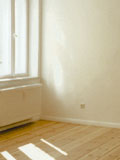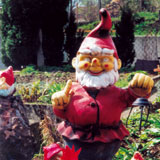Accommodation
Looking for an Apartment

Flats for rent are listed in many of the newspapers. These lists often come out in the weekend issues (Saturdays). You can find these offers in the classifieds section ("Kleinanzeigen") and then look for the property section ("Immobilienteil"). This has flats to rent ("Vermietungen") and flats to buy ("Wohnangebote"). There is either a telephone number that you can call or a "Chiffre" number. In this case a letter must be sent to the newspaper quoting the "Chiffre" number. The newspaper will then forward the letter to the respective person advertising the flat.
If you want to place an advert yourself as someone looking for an apartment, then it’s best to phone the newspaper’s "classified ad" department as they can help you further. Placing an advert normally incurs a fee.
Most newspapers also have Internet websites. You can check flat offers and place adverts at any time on the Internet, irrespective of the day the flat offers were or are due to be published. There are also a number of companies offering services to help look for an apartment. In many larger cities, magazines that specialize in real estate offers are available. It is also possible to gain an overview of the property market in your respective city and to look at offers over the Internet. There are also a number of special abbreviations used in adverts that describe the apartments on offer. Here are some of those terms:
- "2 ZKB" means 2 rooms, kitchen, bathroom.
- "2 ZKBB" means 2 rooms, kitchen, bathroom, balcony.
- "EG" means Ground floor
- "2. OG" means second floor
- "DG" means roof or loft apartment
- "VH" means front of the house
- "HH" means back yard of the house
- "qm" means square metre and describes the size of the apartment.
- "KM" means "Kaltmiete" (cold rent; i.e. rent without heating costs)
- "NK" means "Nebenkosten" (ancillary costs); these are extra costs for refuge disposal, street and house cleaning costs as well as heating and water costs
- "WM" means "Warmmiete" (warm rent; this is the cold rent plus the "NK" ancillary costs)
- "WBS" means "Wohnberechtigungsschein"; this is a certificate that allows you to live in certain cheaper apartments
Real estate agents are private companies that deal in renting or selling apartments. The addresses of real estate agents can be found in the "Yellow Pages" (look for "Makler" or "Immobilienmakler"). Most of these companies charge a fee, which is called a "Courtage" or "Provision" in Germany.
When looking for a flat it is often helpful to visit your local Housing Office ("Wohnungsamt"). They offer information on "Wohnungsgesellschaften", which are state-run housing associations that provide flats for rent.
A "Wohnberechtigungsschein" ("WBS") is a certificate needed to live in apartments that have been built using state subsidies so as to reduce rent costs. The "Wohnberechtigungsschein" is only available to people below a certain income level. People who have limited means can also apply for housing benefit from their local town hall. This housing benefit is called "Wohngeld".
Rent
Rent, or "Miete" or "Monatsmiete" in German, is the amount paid by the tenant ("Mieter") to the landlord ("Vermieter") every month. This is the "Kaltmiete" (cold rent) plus the "extra costs" such as garbage disposal, street and house cleaning costs, heating and water costs. All of these costs together are called the "Warmmiete" (warm rent). Some of the additional costs are dependent on personal usage such as heating and water costs. The others depend on the size of the apartment. Electricity and telephone costs are normally paid directly by the tenants themselves. The ancillary costs and the costs for gas and electricity are paid monthly at a predetermined fixed rate. Once a year the meters are read and the difference is either refunded by the respective utility company, or the extra costs must then be paid to them.
Rent comparisons can be made in each town or section of the city with the help of a table called the "Mietspiegel". This table lists the rent prices in any area. Thus it is possible to check if the rent is appropriate for that area or even if it is illegal to charge such a high rent. The "Mietspiegel" can be found at the local town hall or at the tenant associations ("Mieterverein"), see below. If the rent is above the legal limit, you can consult a lawyer or a tenant association and take action to reduce the rent.
Rent Contract
When an apartment is rented a rent contract ("Mietvertrag" is signed. This contract contains the particular details of the apartment (the cost of the rent, the size of the apartment, the number of rooms, etc). The rent contract also contains the rights and obligations of the tenant and landlord (period of notice, house pets, etc). Once the contact is signed, both parties accept the contract and are legally bound to the contract. But there are also certain legal rules that limit the validity of certain clauses within rent contracts. Most landlords insist that tenants have a valid bank account.
A deposit ("Kaution") normally has to be paid by a tenant as a financial guarantee in case of damage to the apartment. The deposit is normally 1 or 2 months cold rent and is not permitted to be more than 3 times the net cold rent. The deposit has to be placed in a bank account with interest. The tenant receives the deposit plus interest after moving out of the apartment as long as this occurs according to the terms of the rent contract. The landlord is allowed to deduct money from the deposit to pay for any repairs to the apartment.
Tenant Protection
Tenant protection associations, known as "Mieterschutz-Vereine", represent the interests of the tenant. Many relationships between the tenant and landlord are unproblematic. But if conflicts do arise then these tenant protection associations will provide help for tenants. Tenant protection associations have offices in most towns and cities. The website of the national tenant association ("Deutscher Mieterbund") can be found at ![]() www.mieterbund.de.
www.mieterbund.de.
Pets

Whether or not pets may be kept in an apartment must be discussed with the landlord. If a tenant wants to have a pet in the flat where they already live then the rent contract or the landlord can be consulted to see if this is allowed. House pets include dogs, cats, birds, hamsters, guinea pigs, etc. Keeping animals such as sheep and pigs, etc, is generally not permitted.
Dog owners must pay a special dog tax and certain inoculations are necessary. Information can be found at your local town hall. So-called fighting dogs and other dogs classified as dangerous are subject to certain regulations. Dog owners are required to remove all excrement left by their animals on the streets, although this is often not done.
House Caretaker, House Management
In houses with a number of tenants, there is often a house caretaker ("Hausmeister") and a house management ("Hausverwaltung"). The house caretaker and house management are responsible for organisational measures and repairs within the house and the apartments.
House Rules
In larger apartment blocks with numerous tenants there is normally a set of house rules ("Hausordnung"). Certain problems associated with living together in a joint house are addressed in the house rules, for example, allocating who is responsible for cleaning the stairs (which are called "Hausflur" or "Treppenhaus" in German) on which days, or laying down the times when residents must maintain quiet within the house.
Winter Service and Street Cleaning

If there is no house caretaker then the residents are bound by law to remove snow and ice from in front of their house during winter. This is generally stated in the rent contract. If the tenants are responsible for removing snow and ice then they are liable for all injuries incurred if they fail to meet their obligations. In some regions the streets also have to be swept once a week.
Neighbours

Neighbours are the other tenants living in the house or those in adjoining houses. In Germany most new tenants introduce themselves to their direct neighbours (i.e. those that live on the same floor). Of course you don’t have to follow this tradition. Some people are pleased to see new faces, while others don’t care who lives in the same house.
Rent Contract Notice and Protection
There are certain periods of notice valid for tenants. These are defined in the rent contract or in the rent laws. Open-ended rent contracts usually have a period of notice of three months. The landlord cannot cancel the rent contract without a reason. This is referred to as "Mieterschutz" in German. If a conflict arises with your landlord, contact a lawyer or a tenant protection association.
Moving Flat
If you move to a new apartment, even if it is in the same town, then you must register with the authorities. Registration forms are available at the town hall or in stationery shops. These are known as "Meldebögen". The Registration Office ("Einwohnermeldeamt") is usually situated in the town hall. This is where the inhabitants of the city are registered. There are often deadlines for registering that have to be kept. It is vital to register swiftly after moving.
If you move to a new address, it is also possible to inform the postal service and have mail redirected to your new apartment. This is called a "Nachsendeantrag". All post will be redirected to your new apartment for a period of six months or one year. However, you will have to pay extra for this service. It is nevertheless generally recommended to inform your correspondents, e.g. authorities, hospital insurance, etc, as soon as possible.
Shared Flats
If at first you do not want to move into your own apartment, you also have the possibility of renting a furnished room in a flat with other people. This can be done by registering at the "Mitwohnzentrale", an organisation that rents furnished rooms and apartments on a temporary basis. You can also check the newspapers. The term used to describe shared flats is "Wohngemeinschaften" or "WG". Often you will see the term "WG Zimmer", which means a room in an apartment with other people. Often these rooms are not furnished. Another possibility is to look for adverts placed on university campus notice boards. Many students who move away for a limited period of time sublet their rooms or apartments. This means that the flats or rooms are rented without a contract being signed with the actual landlord. The contract is merely signed with the tenant ("Untermietvertrag").
